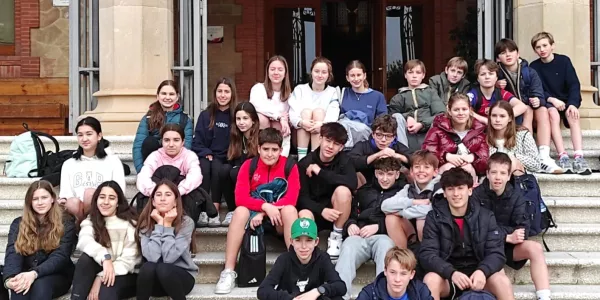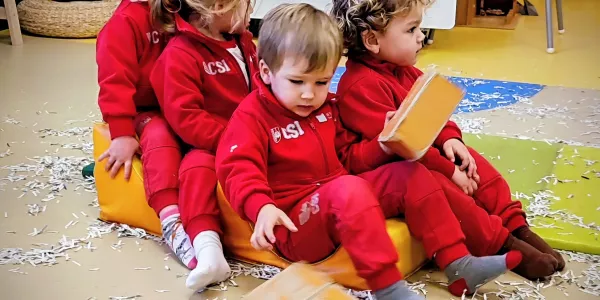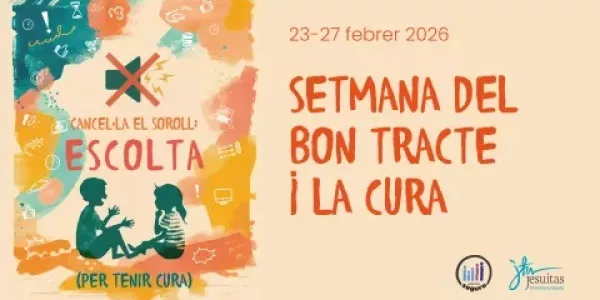November
27th,
2025
Interview with Roberto Quirós, Jesuit Priest
Roberto Quirós, Jesuit and educator, joined us at Sant Ignasi this year
From Alicante (Petrer, 1983) and a Jesuit since 2009, Roberto Quirós started at the school this year. A teacher in Special Education, in Hearing and Language, and a graduate in Humanities, he has always carried out his work in the educational and social field, with a deep sensitivity towards those who are most vulnerable.
Image

Tell us about what you do. How did you come to join the Society of Jesus?
My vocation was born at home and in the parish. My mother has been a great role model in my Christian life, transmitting faith and the closeness of God. In my parish of Santa Creu de Petrer, among people of deep faith, I began to feel the call to follow Jesus more closely. At the age of 26, after being part of a group of young Christians linked to the Jesuits, I decided to enter the Society of Jesus in 2009.
Your first contact with the Society of Jesus came through the Daughters of Saint Joseph, a congregation founded by the Catalan Jesuit Father Butiñà. From there you got to know the Jesuits and, in particular, the figure of Father Arrupe. What about his biography resonated with you?
As you say, it was the Daughters of Saint Joseph who first told me about the Jesuits and, through them, I learned who Pere Arrupe was. I was fascinated when I started reading about his life. I told myself that, if my vocation was to be anything, it had to resemble what I had discovered in that book: a follower of Jesus who is available and helpful, attentive to the suffering in the world.
Each step of the journey has offered me something new and has provided me tools to carry out my vocation as a Jesuit more fully.
Before entering the Society of Jesus, you studied Teaching in Special Education and worked with children with autism. What did this experience offer you?
Working with children with ASD taught me to listen, to look deeper and to accompany complex and difficult-to-express processes. Then, as a Jesuit educator, I discovered the beauty of teaching, of awakening questions, of helping young people find meaning. That patience and that listening—like an older brother—continue to shape the way I support people today.
What would you highlight from the long period of training required to become a Jesuit?
I never considered it as a long period. Each moment of the journey has brought something different and offered me tools to perform my vocation as a Jesuit more fully. The novitiate, in Donostia, was a time of deepening and maturity in my relationship with God. Then I studied Philosophy and Humanities in Salamanca. In my next destination, Oviedo, I had the opportunity to learn about and experience what the educational mission means in the Society of Jesus firsthand. Later, in Madrid, I studied Theology and collaborated at the Padre Piquer school, accompanying young migrants in their learning of Spanish. Through them, I encountered a God who walks alongside those trying to make their way far from their homeland. I also experienced Him in Boston, where I studied Church History. They were two intense years, during which I supported, as a priest, migrant communities in Boston and Los Angeles. There I discovered the presence of God in the most vulnerable people. Upon returning to Spain, I spent four years at the Our Lady of Remembrance College in Madrid. Those were wonderful years, in which I learned to be a priest among students and teachers, between classrooms and playgrounds.
The Tertianship, the last formative stage in the Society of Jesus, took you to Manila, immersing you in the realities of the Philippines and Cambodia. What impact did that have?
This experience brought me back to the roots of my vocation, sharing my life and mission with fellow Jesuits from around the world. There I found myself again with God continuing to call me and sustain me. I also had the opportunity to learn about several educational projects in Southeast Asian countries, and I spent three months in Cambodia with the Jesuit bishop Kike Figaredo. I helped people with physical disabilities, a consequence of the anti-personnel mines that still affect life in the country. It was an experience of embodied faith, in which I understood that the Gospel becomes more real in the most fragile places.
How do your vocation as a Jesuit and priest, and the educational mission, integrate and nourish each other?
My pastoral life has always been linked to the educational and social spheres. Priesthood is joyful when I can put it at the service of students: The Eucharist, especially during retreats, and reconciliation are for me spaces to encounter and grow. What's more, Jesuit priests in education are called to commit ourselves to the integral growth of our students, accompanying both their intellectual education and their human and spiritual development.
Education cannot be limited to passing on knowledge; it must also open paths towards looking inwards, towards the question of meaning, and towards encounters with others and with God.
Now you are in Barcelona, what are the main activities that have been entrusted to you?
My main role is as a priest and teacher at the Sant Ignasi de Sarrià school, an educational institution with a great history in the city of Barcelona. I teach Religion there and try to be available for whatever students and teachers require of me. In addition, I collaborate at Casal Loiola, accompanying young people in their confirmation catechesis and volunteering.
On a personal level, how do you face the change that comes with starting a new mission in a new city and community?
If I were to say that changes of destination are easy that would be a lie; I would say they are some of the most difficult things we can go through. If I'm honest, I still miss the wonderful people I left behind in Asia and Madrid, but I look at this time with enthusiasm and joy, trusting that the Lord will be present in this new stage of my life, as he has done on so many occasions since I became a Jesuit. Furthermore, God has already given me very beautiful moments with magnificent people here in Barcelona.
What were your first impressions of the educational community at Sant Ignasi, and how were your first few days?
The truth is that my first impressions were very good. My colleagues at the school welcomed me warmly and, from the very beginning, have shown me their closeness and willingness to help. It's true that the school is very large, with many teachers and staff, but I trust that, little by little, I will have the opportunity to get to know them all. Moreover, I love being surrounded by people with such a clear vocation for education.
How are you approaching this stage at the school? This new personal journey is set within a broader context, that of the challenges facing the educational world today. How do you see it?
I approach this stage at the school with a hopeful outlook and an awareness of the great challenges that the educational world is facing. We are living in a time of profound change, where technology, globalisation, and the crisis of meaning are testing the way we understand education for our young people. In this context, I feel that spirituality takes on a fundamental value.
Education cannot be limited to passing on knowledge; it must also open paths towards looking inwards, towards the question of meaning, and towards encounters with others and with God. From this perspective, this new stage at the school is an opportunity for me to support people through processes, to help each person discover their own centre, their deepest vocation, and the place that God wants for each of them in the world.


